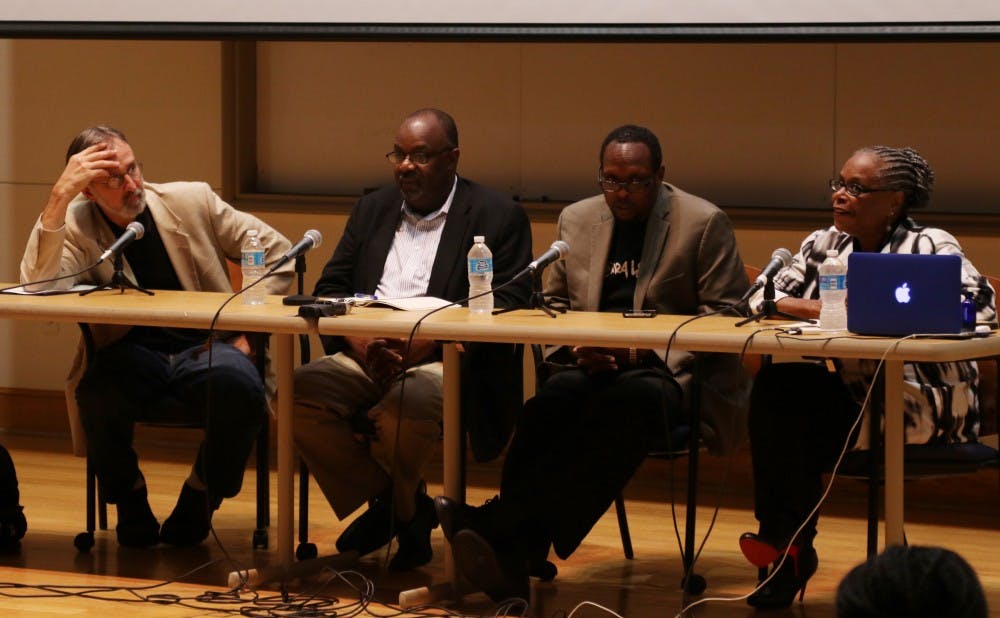A panel of Duke professors reflected Monday night on the future of racial relations in the country and at the University following the tumultuous events of this summer.
WUNC radio correspondent Frank Stasio moderated the “#SummerSyllabus2015 Race Matters” discussion between three Duke professors. A variety of topics were discussed, ranging from the University’s handling of last year’s noose incident, North Carolina’s voter ID laws and the presence of privilege on campus. Almost every seat in White Lecture Hall was filled, with audience members cheering or snapping when a panelist said something particularly powerful.
“There are black students, Latino students and women students that can acknowledge having moments of fear traveling across campus,” said panelist Mark Anthony Neal, professor of African and African American Studies. “But there are folks in the audience that have never had to process that danger.”
A screen behind the panel displayed stirring images related to the discussion. One of the most talked-about photos depicted a Confederate flag rally with a large banner reading “Southern Lives Matter.”
“This seems to be a contest around whose lives matter,” said panelist Karla Holloway, James B. Duke professor of English and professor of women’s studies and law. “There is not one life that has not mattered and made a difference in this country.”
Holloway’s comment references the “Black Lives Matter” hashtag that took off on social media last year. The panelists were interested in how social media has changed the spread of information in each of these incidents, often times for the worse. But while social media is incredibly popular among young people, Neal said that much of the opposition against social media comes from its newness. No one knows exactly how it will have an effect, he explained.
“All these young activists are doing the totality of it, using technology that is at their hands to do incredible work,” Neal said. “The simple pushback is that it’s not traditional grassroots.”
Panelist Kerry L. Haynie, associate professor of political science and director of the Center for the Study of Race, Ethnicity and Gender in the Social Sciences, expressed some concern at the general lack of engagement from young people, especially following the changes to North Carolina’s voter ID laws.
“You wonder why all hell didn’t break loose when the state said we’re going to make it harder for people to have the right to vote,” Haynie said. “It was just sort of business as usual.”
The panel, which occurred a week after a discussion hosted by UNC-TV focusing on tensions between racial minorities and law enforcement, often revolved around issues at the state and national levels. But the conversation also drifted to the events that took place on campus last Spring—namely, the noose that was hung on a tree in the Bryan Center Plaza and the apology that followed.
The anonymous apology letter was posted on Duke News’ website May 1, a month after the incident in question. Both Haynie and Holloway chided the addressee and the University for the letter’s anonymity.
“How do I judge the sincerity of a person without knowing who’s giving it?” Haynie said.
Holloway was incensed by the connotation that comes with anonymity. She said it implied a “need to protect” the writer, and that it was “unsafe” for the community to know their identity.
All four panelists looked to the future with uncertainty. Haynie noted that although Duke has changed for the better, there is still work to be done.
For senior Danielle Sumner, the discussion was “eye-opening.” Sumner said she had followed the noose events but had not considered the anonymity issue until the panel brought it up.
“We still have a long way to go,” Sumner said. “I have to go so far out of my way to understand these issues. I wish it was easier. I wish there was more discourse about them.”
Get The Chronicle straight to your inbox
Signup for our weekly newsletter. Cancel at any time.

